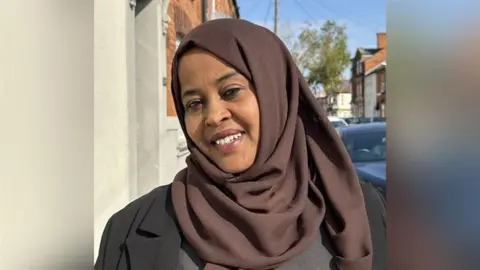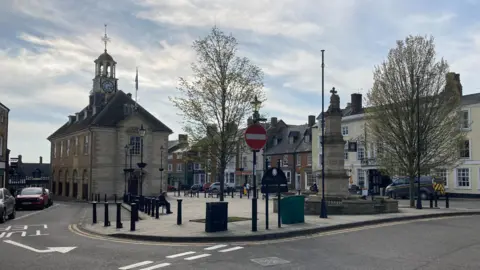Call for action after life expectancy gap revealed
 West Northants Labour Group
West Northants Labour GroupA Labour councillor has called for more investment to bring down health inequalities, after a report showed a 15-year difference in life expectancy for men living in different parts of an authority area.
Fartun Ismail, who oversees Castle ward on West Northamptonshire Council, said men in the part of Northampton she represented could expect to live to 72.6 years.
However, in Brackley West in the south of the unitary authority area, they could expect to live until the age of 87.
Reform-led West Northamptonshire Council said it was working with partners and was committed to reducing inequalities.

The figures have been presented in a new report by West Northamptonshire's former director of public health, Sally Burns, and come from the 2021 Census.
Ms Burns left her role earlier this year to take up a similar position in Birmingham.
The statistics showed women in Castle ward also died years earlier, at the age of 80.2, compared to women in Brackley West at the age of 86.9.
Ismail said: "This is shocking evidence of the health inequalities that persist in our council area despite the best efforts of health partners - almost 15 years difference in life expectancy for men, and six years for women.
"These are people who live just a few miles apart yet have big differences in their life chances. We must act now to change these statistics and help everyone lead longer, healthier lives."
Ismail, who is a member of the Adult Social Care Health and Communities Scrutiny Committee, will be calling for an investigation to tackle the inequalities when the committee meets in June.
She has highlighted three areas of focus: establishing why some people in West Northants die much earlier than others; learning from local authorities that have reduced health inequalities; and putting in measures that can address differences in life expectancy and close the gap.
Reform councillor Laura Couse, cabinet member for adult care, public health and regulatory services, said: "Health inequalities are long-standing in our society with so many varied reasons, from someone's diet, living environment or genetic disposition to their education, income and whether they are socially isolated.
"There isn't a simple quick fix or 'one size fits all' solution. However, we are working closely with our communities and partners to improve opportunities for all residents to have the best outcomes possible."
Follow Northamptonshire news on BBC Sounds, Facebook, Instagram and X.
